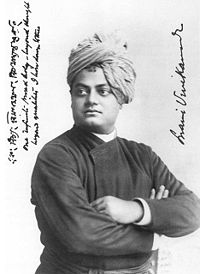10. ते प्रतिप्रसवहेयाः सूक्ष्माः ॥१०॥
te pratiprasava-heyāḥ sūkṣmāḥ ||10||
They, to-be-rejected-by-opposite-modifications, are fine.
How are these fine Samskaras to be controlled? We have to begin with the big waves, and come down and down. For instance, when a big wave of anger has come into the mind, how are we to control that? Just by raising a big opposing wave. Think of love. Sometimes a mother is very angry with her husband, and while in that state the baby comes in, and she kisses the baby; the old wave dies out, and a new wave arises, love for the child. That suppresses the other one. Love is opposite to anger. So we find that by raising the opposite waves we can conquer those which we want to reject. Then, if we can raise in our fine nature those fine opposing waves, they will check the fine workings of anger beneath the conscious surface. We have seen now that all these instinctive actions first began as conscious actions, and became finer and finer. So, if good waves in the conscious Chitta be constantly raised, they will go down, become subtle, and oppose the Samskara forms of evil thoughts.
11. ध्यान हेयाः तद्वृत्तयः ॥११॥
dhyāna heyāḥ tad-vṛttayaḥ ||11||
By meditation, their modifications are to be rejected.
Meditation is one of the great means of controlling the rising of these big waves. By meditation you can make the mind subdue these waves, and, if you go on practising meditation for days, and months, and years, until it has become a habit, until it will come in spite of yourself, anger and hatred will be controlled and checked.
12.क्लेशमूलः कर्माशयो दृष्टादृष्टजन्मवेदनीयः ॥१२॥
kleśa-mūlaḥ karma-aśayo dṛṣṭa-adṛṣṭa-janma-vedanīyaḥ ||12||
The receptacle of works has its root in these pain-bearing obstructions, and their experience in this visible life, or in the unseen life.
By the receptacle of works is meant the sum-total of these Samskaras. Whatever work we do, the mind is thrown into a wave, and, after the work is finished, we think the wave is gone. No. It has only become fine, but it is still there. When we try to remember the thing, it comes up again and becomes a wave. So it was there; if it had not been there, there would not have been memory. So, every action, every thought, good or bad, just goes down and becomes fine, and is there stored up. They are called pain-bearing obstructions, both happy and unhappy thoughts, because according to the Yogis, both, in the long run, bring pain. All happiness which comes from the senses will, eventually, bring pain. All enjoyment will make us thirst for more, and that brings pain as its result. There is no limit to man’s desires; he goes on desring, and when he comes to a point where desire cannot be fulfilled, the result is pain. Therefore the Yogis regard the sum-total of the impressions, good or evil, as pain-bearing obstructions; they obstruct the way to freedom of the Soul. It is the same with the Samskaras, the fine roots of all our works: they are the causes which will again bring effects, either in this life, or in the lives to come. In exceptional cases, when these Samskaras are very strong, they bear fruit quickly; exceptional acts of wickedness, or of goodness, bring their fruits in this life. The Yogis even hold that men who are able to acquire a tremendous power of good Samskaras do not have to die, but, even in this life, can change their bodies into god-bodies. There are several cases mentioned by the Yogis in their books. These men change the very material of their bodies; they re-arrange the molecules in such fashion that they have no more sickness, and what we call death does not come to them. Why should not this be? The physiological meaning of foot is assimilation of energy from the sun. This energy has reached the plant, the plant is eaten by an animal, and the animal by us. The science of it is that we take so much energy from the sun, and make it part of ourselves. That being the case, why should there be only one way of assimilating energy? The plant’s way is not the same as ours; the earth’s process of assimilating energy differs from our own. But all assimilate energy in some form or other. The Yogis say that they are able to assimilate energy by the power of the mind alone, that they can draw in as much as they desire without recourse to the orindary methods. As a spider makes his net out of his own substance, and becomes bound in his net, and cannot go anywhere except along the lines of that net, so we have projected out of our own substance this net-work called the nerves, and we cannot work except through the channels of those nerves. The Yogi says we need not be bound by that. Similary, we can send electricity to any part of the world, but we have to send it by means of wires. Nature can send a vast mass of electricity without any wires at all. Why cannot we do the same? We can send mental electricity. What we call mind is very much the same as electricity. It is clear that this nerve fluid has some amount of electricity, because it is polarised, and it answers all electrical directions. We can only send our electricity through these nerve channels. Why not send the mental electricity without this aid? The Yogi says it is perfectly possible and practicable, and that when you can do that you will work all over the universe. You will be able to work with anybody anywhere, without the help of any nervous system. When the soul is acting through these channels we say a man is living and when those channels die the man is said to be said. But when a man is able to act either with or without these channels, birth and death will have no meaning for him. All the bodies in the universe are made up of Tanmatras, and it is only in the arrangement of them that there comes a difference. If you are the arranger you can arrange that body in one way or another. Who makes up this body but you? Who eats the food? If another ate the food for you, you would not live long. Who makes the blood out of it? You, certainly. Who assimilates the blood, and sends it through the veins? You. Who creates the nerves, and makes all the muscles? You are the manufacturer, out of your own substance. You are the manufacturer of the body, and you live in it. Only we have lost the knowledge of how to make it. We have become automatic, degenerate. We have forgotten the process of manufacture. So, what we do automatically has again to be regulated. We are the creators and we have to regulate that creation, and as soon as we can do that we shall be able to manufacture just as we like, and then we shall have neither birth nor death, disease, or anything.
13. सति मूले तद्विपाको जात्यायुर्भोगाः ॥१३॥
sati mūle tad-vipāko jāty-āyur-bhogāḥ ||13||
The root being there, the fruition comes (in the form of) species, life, and expression of pleasure and pain.
The roots, the causes, the Samskaras being there, they again manifest, and form the effects. The cause dying down becomes the effect, and the effect becomes more subtle, and becomes the cause of the next effect. The tree bears a seed, and becomes the cause of the next tree, and so on. All our works now, are the effects of past Samskaras. Again, these Samskaras become the cause of future actions, and thus we go on. So this aphorism says that the cause being there, the fruit must come, in the form of species; one will be a man, another an angel, another an animal, another a demon. Then there are different effects in life; one man lives fifty years, another a hundred, and another dies in two years, and never attains maturity; all these differences in life are regulated by these past actions. One man is born, as it were, for pleasure; if he buries himself in a forest pleasure will follow him there. Another man, wherever he goes, pain follows him, everything becomes painful. It is all the result of their own past. According to the philosophy of the Yogis all virtuous actions bring pleasure, and all vicious actions bring pain. Any man who does wicked deeds is sure to reap the fruit of them in the form of pain.
14. ते ह्लाद परितापफलाः पुण्यापुण्यहेतुत्वात् ॥१४॥
te hlāda paritāpa-phalāḥ puṇya-apuṇya-hetutvāt ||14||
They bear fruit as pleasure or pain, caused by virtue or vice.
 Swami Vivekananda
Swami Vivekananda
